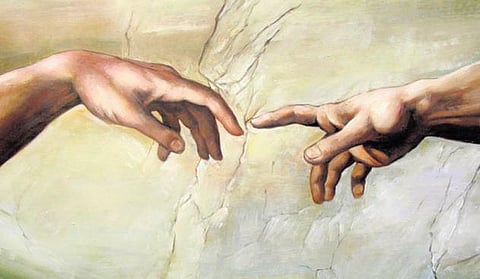

Dogma is for the intellect and faith for the mind. Dogma is the code of working, behaviour and conduct while faith is the belief or conviction. Specific faith may or may not be based on any dogma. But dogma is based on an ideology, on unwritten or written strands of thought established through tradition or scriptural in origin. The human race has all along striven for peace, happiness and fulfilment. For this, dogmas drawn from scriptures were set through history.
Faith is belief in an almighty universal power regulating the material nature and the lives of living beings developed over time. The present times of the 21st century are marked by new challenges and questions faced by humanity. Today’s world abounds in dogmas and multiple faiths, interestingly all aimed at the deliverance of mankind from misery and sorrows of all kinds. But happiness, fulfilment, peace and harmony on a comprehensive scale are not in evidence even in today’s world.
One set of dogmas contradicts the other; one type of faith strikingly contrasts with the other. And in this realm of multiple dogmas and faiths, all ostensibly serving the common purpose of peace, happiness and fulfilment, the major global population of the 21st century experiences an ideological vacuum and a crisis of faith, and is witness to an increasing indifference and apathy to traditional religious rituals and practices. With scientific developments having revolutionised the human lifestyle, a serious crisis of environmental degradation stares mankind in the face. This crisis has already started manifesting itself in climate change, global warming and the resulting catastrophes.
What is the solution to the present set of problems?
All dogmas are incontrovertibly unanimous on conduct that is honest and truthful and on action, which is conducive to peace, harmony and preservation of environmental purity. All dogmas eloquently agree on the necessity of human action which is just, equitable and oriented towards the welfare of all living beings. And of faith? Faith in a supernatural power, who is omnipresent, omnipotent, omniscient and supreme creator, is an element common to followers of almost all religions. For atheists, the dogmas of righteous action are sufficient to guide them to their goals of emancipation from the sorrows of life.
Dogma and faith are complementary but where dogma is the mantra for progress, faith is the mystic key to access that mantra. Right action follows right knowledge but faith helps a person to tap the beneficent spiritual energy of the supreme creator for his progress. However, the benevolent creator showers his blessings on his atheist and agnostic subjects too. Therefore, ultimately dogma and faith are mutually exclusive as much as they are complementary instruments of human progress.
Dogmas could be well understood by individuals and then followed for the desired results. But faith as a core belief may or may not be a matter of understanding. In the latter case, it becomes associated with mysticism and creeps out of the realm of conscious understanding. Human beings, being innately of limited intellectual prowess, naturally have to lean on faith as an instrument of their deliverance. But in actual terms, every phenomenon in this vast universe is subject to scientific scrutiny and occurs according to eternal scientific principles. Nothing in the universe happens on an irrational and illogical basis. Hence dogma and faith converge where the understanding gaps of humans close.
Mind and intellect are the tools available to the human being to advance materially and spiritually. Dogma feeds the intellect and faith feeds the mind. The supreme creator has made everything very simple. The ignorant man has made simple things complicated. But right precepts clear these and faith helps in this through divine intervention. The creator wants us to live in total happiness and peace, and so do we want.
Let us help him and ourselves in this pursuit of peace and happiness through dogmas based on the universalistic, simple tenets of righteous action and faith borne out by our natural instincts as children and subjects of the supreme divine creator. He is our true liberator, for he guides us through this thick jungle of confusion and adversity, and pulls us out of the mire of misery which is our own creation, being the retributive effect of our vicious actions. Dogma and faith, in the ultimate analysis, as the elements of our progress plan, are two faces of the same coin. They act as the twin tools of traversal of the path leading to the ultimate abode where the human soul exists in divine bliss.